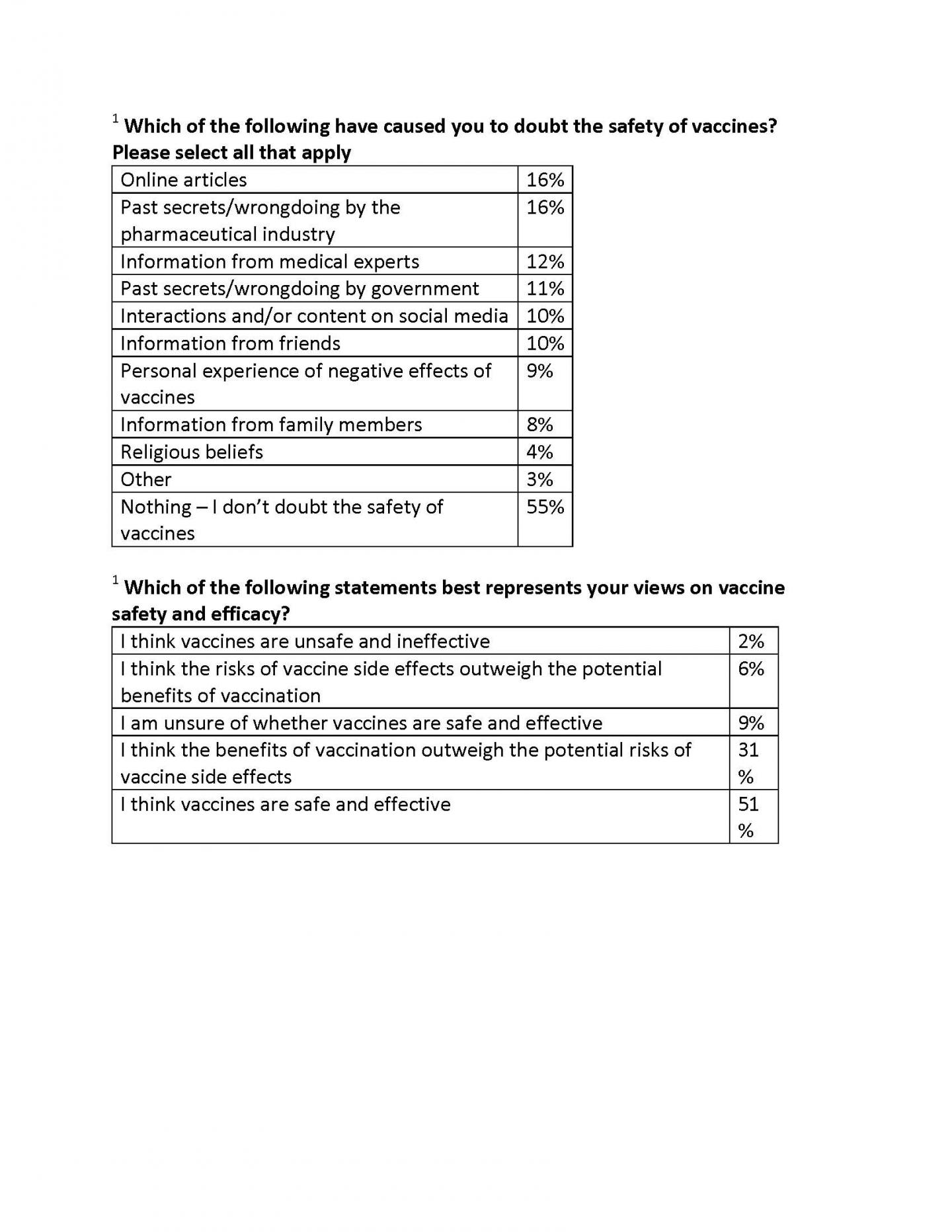Americans cite online articles, past secrets/wrongdoing by pharmaceutical industry and information from medical experts as top sources of suspicion

Credit: American Osteopathic Association
CHICAGO–June 24, 2019–A recent online survey of more than 2,000 U.S. adults, conducted by The Harris Poll on behalf of the American Osteopathic Association, revealed that more than two in five American adults (45%) say something has caused them to doubt vaccine safety.
The spread of negative attitudes towards vaccines is a phenomenon deeply rooted in human psychology and amplified by social media, according to perinatal psychiatrist Rachel Shmuts, DO.
“From an evolutionary perspective, humans are primed to pay attention to threats or negative information,” she says. “So it makes sense that people hold onto fears that vaccines are harmful, especially when they believe their children are in danger.”
She believes it is possible that, since vaccines have been so effective in eradicating disease, people may have more fear of possible vaccine side effects than the actual diseases vaccines prevent.
“For some, it really might be that vaccines are viewed as the more salient threat,” says Dr. Shmuts.
Although 55% of Americans don’t doubt vaccine safety, 45% noted at least one source that caused doubts about the safety of vaccination. The top three doubt-causing sources were online articles (16%), past secrets/wrongdoing by the pharmaceutical industry (16%) and information from medical experts (12%).
No more room for doubt
The survey also asked Americans to choose a statement that best represented their feelings about vaccine safety and efficacy. While the vast majority (82%) chose in favor of vaccines, 8% selected responses expressing serious doubt. An additional 9% said they were unsure.
Physicians say those small margins can cause significant damage to public health if the doubts result in more unvaccinated people.
“Some diseases, like measles, require as much as 95% of the population to be vaccinated in order to achieve herd immunity,” says osteopathic family physician Paul Ehrmann, DO. “Our practice considers itself a steward of public health, so we do not take new patients who refuse to vaccinate.”
Dr. Ehrmann explains that herd immunity is essential to maintain, because some people cannot be vaccinated due to medical conditions including allergies, illness, or a weakened immune system. Keeping the rest of the population vaccinated protects those who are vulnerable.
“People know that a lot of practices won’t accept patients who don’t vaccinate, so when they find one that will, they spread the word to their community that it’s a safe place. Whether intentional or not, those doctors are often seen as endorsing anti-vaxxer beliefs,” Dr. Ehrmann said.
Winning patients back
While social media has helped spread misinformation about vaccines, it has not been effective for countering those claims, even with scientific research, according to Dr. Shmuts.
She explains that confirmation bias–the tendency to trust new information that bolsters existing beliefs and discredit information that challenges those beliefs–makes it difficult to convince someone vaccines are safe, effective and necessary once they believe they are not.
“The number of people who believe vaccines are dangerous and refuse to get them is still relatively small. However, online support groups seem to solidify their beliefs, making them less susceptible to influence from their neighbors and real-world communities,” says Dr. Shmuts.
Dr. Ehrmann agrees, adding that arguing or being judgmental with patients only pushes them further into communities that share their beliefs. Instead, he thinks policy changes are likely the most effective means to change behaviors, if not hearts and minds.
His home state of Michigan discontinued public education for vaccines in the mid-2000s and allows for medical, religious and philosophical exemptions for vaccination, making the state accommodating to anti-vaxxers. As recent as 2015, Michigan ranked 44th in the country for the number of vaccinated children 19 months to 35 months.
However, in 2017 the state, with other partners, launched a public information campaign that has significantly improved vaccination rates across demographics.
“Beliefs are hard to change especially when they’re based in fear,” says Dr. Ehrmann. “But, being responsible for our patients’ health and the public’s health, we can’t afford to give in to those fears. We must insist on evidence-based medicine.”
###
About the AOA
The American Osteopathic Association (AOA) represents more than 145,000 osteopathic physicians (DOs) and osteopathic medical students; promotes public health; encourages scientific research; serves as the primary certifying body for DOs; and is the accrediting agency for osteopathic medical schools. To learn more about DOs and the osteopathic philosophy of medicine, visit http://www.
Survey Method
This survey was conducted online within the United States by The Harris Poll on behalf of AOA from May 28 – 30, 2019 among 2,007 U.S. adults. This online survey is not based on a probability sample and therefore no estimate of theoretical sampling error can be calculated. For complete survey methodology, including weighting variables and subgroup sample sizes, please contact Jeff Brennan.
Media Contact
Jeff Brennan, Media Relations Manager
312-771-0126 | [email protected]
Media Contact
Jeff Brennan
[email protected]




